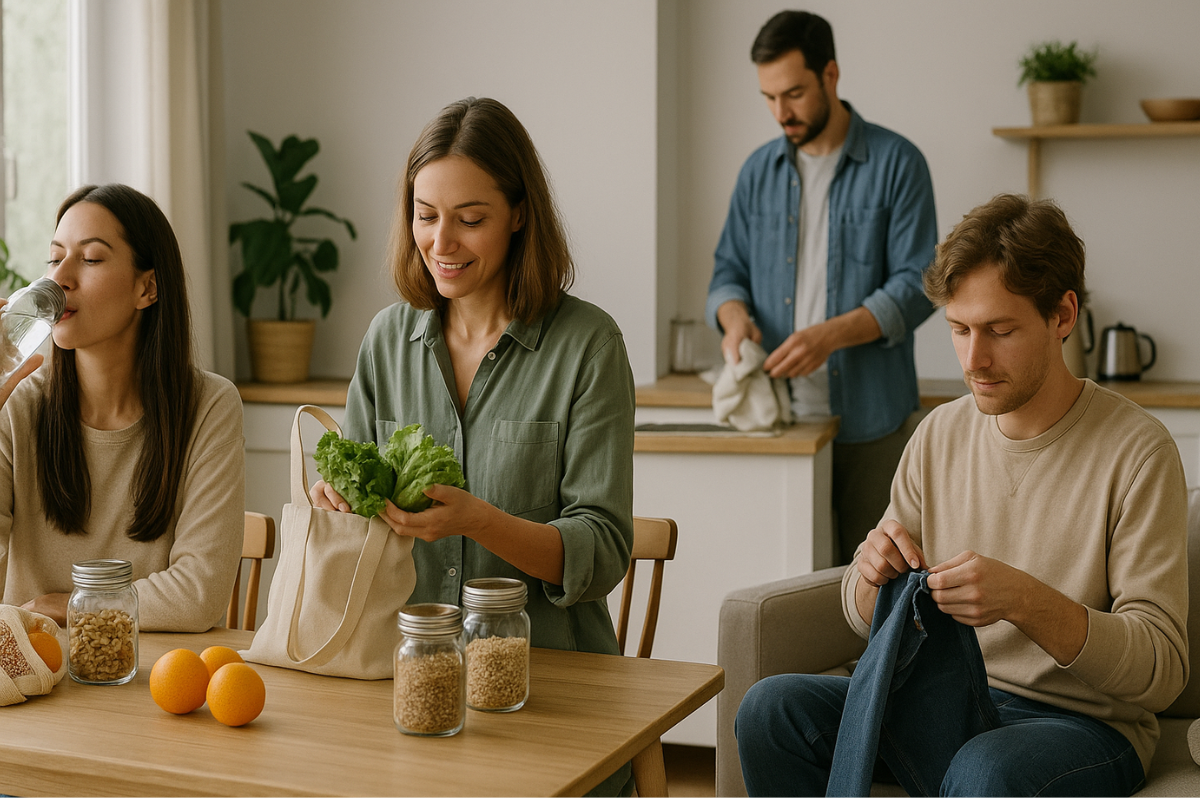Sustainability doesn’t always require grand gestures like installing solar panels or giving up your car. In reality, the most lasting environmental change comes from simple, consistent habits. When practiced daily, these small shifts ripple out into significant long-term impact—not only on the planet but also on your lifestyle and mindset.
Here are 10 small, realistic habits you can adopt today that will help you live a greener, more intentional life.
1. Bring Your Own Reusables
It’s one of the easiest habits to build—and one of the most effective.
Essentials to carry:
- A reusable water bottle
- A cloth shopping bag
- A stainless steel or bamboo straw
- A reusable coffee cup
- A container for leftovers or takeout
Keep these in your bag, car, or workspace so they’re always within reach.
2. Buy Less, Choose Better
The most sustainable item is the one you didn’t buy. But when you do need to purchase something, opt for quality over quantity.
Tips to consume consciously:
- Avoid impulse shopping
- Invest in long-lasting materials
- Support ethical and eco-friendly brands
- Borrow or buy second-hand whenever possible
Thoughtful consumption leads to less waste and more satisfaction.
3. Eat More Plant-Based Meals
Reducing meat and dairy, even part-time, lowers your carbon footprint and saves water.
Simple changes:
- Try “Meatless Mondays”
- Substitute beans, lentils, or tofu for meat
- Explore cuisines with plant-based traditions (like Mediterranean or Indian)
You don’t have to be vegan to make a difference—every plant-forward meal counts.
4. Reduce Food Waste
Wasting food wastes everything that went into producing it—land, water, labor, and fuel.
Small ways to waste less:
- Plan meals and buy only what you need
- Use leftovers creatively
- Freeze food before it spoils
- Compost scraps if possible
Track what you throw away to learn and improve.
5. Reuse and Repurpose Before Recycling
Recycling is important, but it should be your last resort—not your first.
Ideas to reuse:
- Glass jars as food containers or planters
- T-shirts as cleaning cloths
- Packaging as gift wrap or crafts
- Leftover paper as note pads
Get creative—reuse is where sustainability meets innovation.
6. Switch to Natural Cleaning Products
Harsh chemical cleaners pollute water and come in wasteful plastic bottles.
Natural alternatives:
- White vinegar, lemon, and baking soda
- Refillable spray bottles
- DIY recipes for all-purpose cleaner and scrubs
They’re safer for your health and gentler on the planet.
7. Unplug Devices When Not in Use
Even when turned off, many electronics draw energy—this is called “phantom load.”
What to do:
- Unplug chargers, microwaves, TVs, and gaming consoles
- Use a smart power strip for convenience
- Set your devices to energy-saving modes
This habit saves both electricity and money.
8. Walk or Bike When Possible
Short car trips are among the most polluting. Switching to active transport helps reduce emissions and improves your health.
Try to:
- Walk or cycle for errands under 2 km
- Use public transport more often
- Combine errands to limit driving time
- Join a local carpool group
Every trip matters—especially when done regularly.
9. Buy in Bulk or With Less Packaging
Packaging waste, especially plastic, accounts for a huge portion of household trash.
Shopping tips:
- Bring your own containers to bulk stores
- Choose products in cardboard, glass, or aluminum
- Avoid single-use sachets or individually wrapped items
- Support stores that offer refills
The less packaging you bring home, the less you have to throw away.
10. Share, Borrow, and Repair
Living sustainably doesn’t mean going without—it means rethinking access.
Community-minded habits:
- Borrow tools or appliances you rarely use
- Swap clothes or books with friends
- Learn basic sewing or repair skills
- Support repair cafés or local fix-it events
These practices strengthen community and reduce unnecessary waste.
One Habit at a Time
Don’t feel pressure to overhaul your lifestyle overnight. Choose one or two habits that feel easy and realistic for you right now. Then build from there. Small actions, repeated daily, create real momentum.
Sustainability is not about perfection—it’s about intention. Every reusable bag, every plant-based meal, every unplugged appliance is a quiet act of care. And when those actions become part of your daily rhythm, they lead to a life that’s not only more sustainable but also more connected and meaningful.
